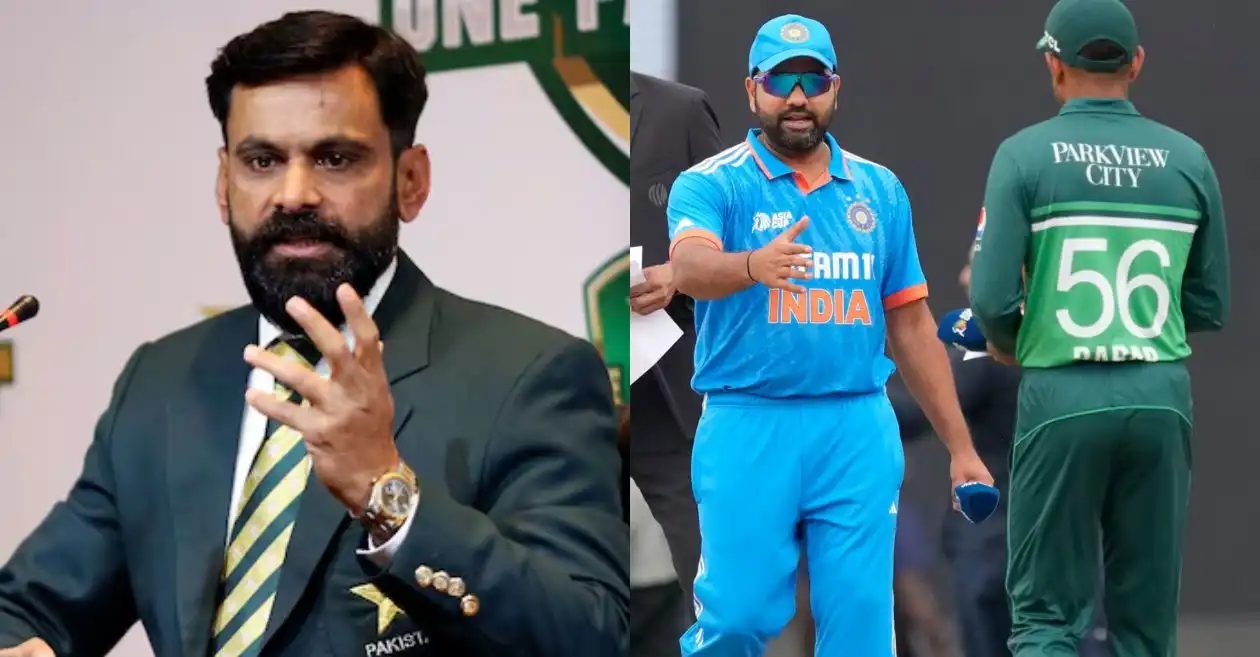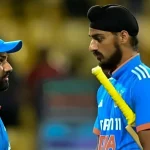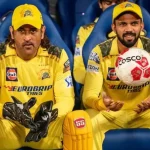India’s recent decision to decline participation in the 2025 ICC Champions Trophy set to be hosted by Pakistan has created a wave of reactions across cricket circles. Former Pakistan captain Mohammad Hafeez is among several prominent voices criticizing the Board of Control for Cricket in India (BCCI), highlighting the frustration felt by Pakistan’s cricketing community. With the BCCI citing security concerns, the issue now appears to be a complex diplomatic challenge, potentially impacting the future of the tournament and casting uncertainty over Indo-Pak cricket relations.
Hafeez Lashes Out: “It Was a Dream to See India Play in Pakistan”
Expressing frustration, Mohammad Hafeez openly criticized the BCCI’s refusal, calling it “a daydream” to expect India to tour Pakistan. Hafeez voiced his sentiments on X (formerly Twitter), asserting that Pakistan has proven itself as a capable host by successfully organizing tours for Australia, England, and the West Indies in recent years. Hafeez’s remarks encapsulate the growing disappointment within Pakistan’s cricket community, especially given the strides Pakistan has taken to ensure safety and stability for international events.
Hafeez emphasized that Pakistan is “safe and ready” to host the tournament, and he expects both the Pakistan Cricket Board (PCB) and the government to respond decisively. The former captain’s comments reflect a widespread belief that India’s refusal is politically motivated rather than a matter of genuine security.
Security Concerns or Political Strain? BCCI’s Position Explained
The BCCI cited security concerns as the primary reason behind its refusal, but Hafeez and others in Pakistan’s cricketing circles find this justification questionable. The BCCI’s position, however, aligns with a longstanding policy. Since the 2009 attack on the Sri Lankan cricket team in Lahore, India has remained cautious about playing in Pakistan, leading to a hiatus in bilateral series between the two countries. While Pakistan has hosted several major cricketing nations in recent years, the BCCI’s stance reflects the broader political tensions that continue to affect sports diplomacy between the two nations.
Security experts have pointed out that the BCCI’s refusal may stem from domestic concerns about ensuring the safety of the Indian team. However, cricket analysts argue that this reasoning becomes harder to justify as Pakistan increasingly proves its ability to host international matches without incident. With both countries possessing strong opinions, the situation underscores how cricket often finds itself at the center of broader diplomatic relations between India and Pakistan.
PCB Calls for Government Intervention and Response from ICC
The Pakistan Cricket Board (PCB) has expressed disappointment over India’s stance and is now looking to its government for guidance on the next steps. With the ICC formally notifying the PCB of India’s refusal, the board is seeking direction on how best to proceed. Despite the challenge, the PCB remains hopeful of finding a resolution that preserves Pakistan’s rights as the host nation for the Champions Trophy.
As the PCB and government deliberate, ICC officials are expected to facilitate further discussions to avoid an outright cancellation. For the ICC, which values its flagship events, maintaining an inclusive tournament with all participating teams is paramount. Sources within the ICC indicate that a hybrid model—similar to that used for the Asia Cup 2023—may be on the table as a potential compromise.
Mohammad Hafeez’s Call for Action: “Pakistan Must Take a Stand”
In addition to his criticisms, Hafeez called on both the PCB and the Pakistani government to adopt a strong stance on the issue. His frustration reflects a sentiment shared by other Pakistani players and fans who feel that India’s reluctance to tour is setting a precedent of exclusion. Hafeez’s post received widespread support from Pakistani fans, who argue that the BCCI’s decision undermines Pakistan’s efforts to reintegrate into the international cricketing circuit after years of isolation.
Hafeez’s suggestion of a “strong and surprised response” suggests a growing demand within Pakistan for a decisive, perhaps unconventional, strategy to counter India’s reluctance. Some fans and commentators have even called for a boycott of ICC events hosted in India, although the PCB has not endorsed this idea. For Hafeez and others, the issue extends beyond a single tournament, symbolizing Pakistan’s efforts to reclaim its status as a safe and viable host for global cricketing events.
Potential Hybrid Model: UAE as an Alternative Venue for Indian Matches?
The ICC is reportedly considering a hybrid model, similar to the one adopted for the Asia Cup 2023. In that tournament, Pakistan hosted most games, but India’s matches were held in Sri Lanka. If this model is applied to the Champions Trophy, the United Arab Emirates (UAE) could serve as an alternate venue for matches involving India. With its established infrastructure and history of hosting international matches, the UAE presents a practical solution, albeit one that would diminish Pakistan’s role as the host.
The hybrid model remains a point of contention, with some Pakistani fans viewing it as a compromise that undermines Pakistan’s ability to host an entire ICC event on its own. However, supporters of the model argue that it offers a way to preserve Pakistan’s hosting rights while accommodating India’s concerns, allowing the tournament to proceed without excluding either country.
History Repeats: Parallels with the 2023 Asia Cup Scenario
The Champions Trophy dispute closely mirrors the situation with the 2023 Asia Cup, where India’s refusal to play in Pakistan resulted in a hybrid hosting arrangement. During that tournament, Pakistan hosted some games, while India’s matches were held in Sri Lanka. Although the tournament proceeded without incident, it highlighted the logistical complexities that arise when political tensions impact international sporting events.
For both India and Pakistan, the Champions Trophy represents a high-stakes event. This ongoing dispute underscores a recurring theme in Indo-Pak relations—how diplomatic challenges impact sports, often requiring creative solutions to maintain international engagement. The Asia Cup precedent suggests that the hybrid model could work again, but it also leaves the future of bilateral cricket relations uncertain.
Champions Trophy’s Future in Question: Will ICC Find a Middle Ground?
As the November 11 schedule announcement looms, the ICC finds itself navigating a difficult balancing act. Cricket fans worldwide are eager for clarity, yet the dispute has cast a shadow over the tournament’s future. While a hybrid model appears to be the most feasible compromise, the question remains whether both sides will accept it.
The ICC’s priority will be to ensure that the Champions Trophy proceeds with all participating nations, but the situation reflects the broader challenge of managing political tensions within a global sporting framework. Cricket’s governing body is thus tasked with reconciling competing interests, ensuring fair representation for all member nations, and preserving the spirit of the sport.
Please check for information on the best betting sites in India – https://selectory.org/best-betting-sites/















